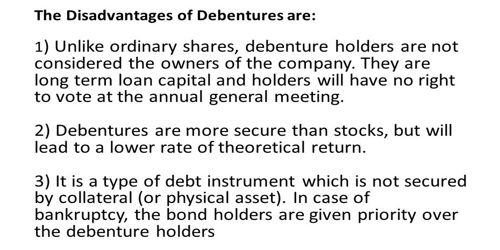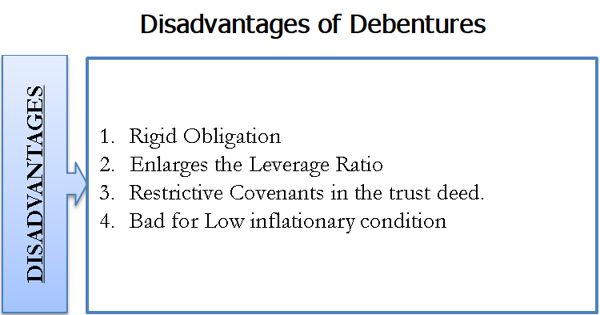A debenture refers to a document that explicitly details the terms and conditions of a loan to a company. They are the liability of the company which has to be repaid in a specific time period; however, a feasible alternative of term loans for companies. The primary aim of a company debenture is to provide security and reassurance to the lender and usually contains a fixed and floating charge. If the business were to enter insolvency, they would recover their money ahead of unsecured creditors.
Disadvantages of debentures

The following are the limitations of Debentures.
- The permanent burden of interest
Interest on debentures is always cumulative. It is to be paid irrespective of the profits or otherwise of the company. With redeemable debenture, the company has to make provisions for repayment on the specified date, even during periods of financial strain on the company. During the period of depression, it becomes a heavy burden.
- Limits company’s credit
Each company has a certain borrowing capacity. Since in most cases, the assets of the company are mortgaged with the debenture holders as a security against their advances, the creditworthiness of the company falls in the eyes of the public as well as the banks. With the issue of debentures, the capacity of a company to further borrow funds reduces. Borrowings from other sources becomes difficult.
- No right to participate in company management
Ordinarily, debenture holders do not enjoy any voting rights in the companies. They have no interest in the election of directors. They do not have representation in the management of the affairs of the companies.
- No flexibility
As far as the company is concerned, there is no flexibility in their obligation to make interest payments on the debenture. In times of financial difficulty, this can compromise business growth, and even force insolvency in some cases.
- Risk Factor
Debenture puts a permanent burden on the earnings of a company. Therefore, there is a greater risk when the earnings of the company fluctuate.
- Controlling Power
Restrictions imposed by securing the debenture with an asset or asset class takes away the management’s freedom to control or use the assets at will. By holding a debenture, the lender loses their right to vote and take a share of company profits.
- Permanent Burden
Since the company has to pay interest whether it makes a profit or incurs loss, it becomes a permanent burden on the financial resources of the company. During the depression, the company will find it difficult to repay the principal and fixed interest.
Disadvantages for the company
The interest payments for the lender – outlined in the debenture document – are obligatory. Should the company face financial difficulties, it could further contribute to their losses. If the debenture has a fixed charge attached, the control of the asset is lost as the company must receive permission to sell from the lender.
Disadvantages for the lender
Many lenders do not find debentures attractive as holders do not carry any voting rights with regards to the company. If you are currently experiencing financial difficulties, and wondering which is the best way forward for your business, our business rescue experts can provide debt management advice, and offer the best solution for your current financial situation.
Information Source:
















